Search results for “delaware river basin”

Meet TU’s resident river doctor, Sara Porterfield. With a PhD in the transnational history of the Colorado River Basin and a background as a rafting guide with the Colorado Outward Bound School, Sara brings a unique perspective to both the high-level policy discussions happening about the future of this watershed and the impacts of the…

We are in the midst of a once-in-a-generation build-out of major interstate pipelines to move natural gas from the Marcellus shale region to markets, other transmission lines, and export terminals on the East Coast. If not properly managed, this construction boom could have major impacts on the streams and forests of the Delaware River Basin…

As infrastructure to support natural gas extraction expanded across the Appalachians over the past decade, the Delaware River Basin remained untouched as the group responsible for the coordinated management of the watershed considered the practice. Now, after years of uncertainty, a vote by the Delaware River Basin Commission has formalized a ban on high-volume hydraulic fracturing — often called “fracking” — in the basin. In a special business meeting on Feb. 25, 2021, commissioners…

Trout Unlimited’s efforts in the Delaware River Basin will get a boost as a result of the federal 2021 budget. The Delaware River Basin Restoration Program (DRBRP) received $10 million in funding as part of the fiscal year 2021 Appropriations bill recently approved by Congress and signed by President Trump. The sum is a modest increase from the $9.7 million budgeted last fiscal year. The…
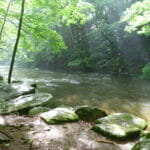
A section of the Musconetcong River in New Jersey restored by TU. (TU/Brian Cowden) By David Kinney For the first time, Congress is setting aside dedicated funds for conservation efforts in the Delaware River Basin. Consider the $5 million appropriation included in the new budget agreement a down payment for the Delaware River Basin Restoration…
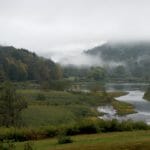
By Rob Shane For those in the Mid-Atlantic, or for anyone who’s been trout fishing long enough to have a bucket list of rivers, you’re certainly familiar with the Delaware River. Aside from being the source of drinking water for more than 15 million people in two of the largest cities in the United States (New York and Philadelphia), it…
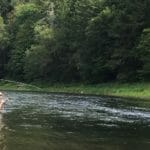
By Keith Curley The Delaware River Basin Commission (DRBC) has begun a rulemaking process to protect one of our most valuable fisheries from the impacts of hydraulic fracturing, formalizing a de facto moratorium in place since 2010. Across the country, Trout Unlimited advocates for responsible energy development, which involves protecting the highest quality habitats and…

By Mark Taylor In the early morning hours Saturday, Congress stepped up to protect one of America’s most historic watersheds. The Delaware River Basin Conservation Act, first introduced in 2010 and long a priority for Trout Unlimited and our partners in the region, finally cleared both the House and Senate as a provision…
A Step Forward For The Ailing Delaware River, Fishery Still At Risk From Drought A Step Forward For The Ailing Delaware River, Fishery Still At Risk From Drought Trout Unlimited applauds DRBC action, calls for scientific review of flows for Upper Delaware tailwaters Contact: Nat Gillespie Catskills Coordinator TU (607) 498-5960 4/5/2002 — Hancock, N.Y…
Delaware River NLC Workgroup Represents TU on efforts to develop fish-protective minimum flow agreements in the Delaware River Basin. Committee Members Co-Chair: Donald Kieffer – New York Co-Chair: Peter Tovar – New Jersey TU Staff Contact: Emily Baldauff, Mid Atlantic Organizer Meets: The 4th Monday of each month at 7:00 PM ET. Delaware River…
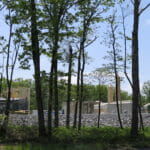
This hydraulic fracturing well pad is located on a state forest in Eastern Pennsylvania. By David Kinney In the four months since the Delaware River Basin Commission issued proposed regulations covering hydraulic fracturing, thousands of people have come forward to speak at public hearings and in written comments about the importance of protecting natural resources…
Delaware River Trout Dodge Bullet Delaware River Trout Dodge Bullet High rain totals save rivers for time being. Long-term flow problems remain with NYC reservoirs. Contact: Nat Gillespie Catskills Coordinator Trout Unlimited (607) 498-5960, ngillespie@tu.org 6/12/2002 — Hancock, New York — Today storage levels in New York Citys three reservoirs on upper Delaware River tributaries…
12/8/2003 Trout Unlimited Applauds Upper Delaware River congressional Delegation for Working to Secure Funding to Improve Delaware River Flows Trout Unlimited Applauds Upper Delaware River Congressional Delegation for Working to Secure Funding to Improve Delaware River Flows Contact: Leon Szeptycki Eastern Conservation Director Trout Unlimited 434.984.4919 12/8/2003 — Washington, D.C. — Trout Unlimited (TU) and…
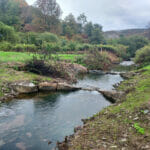
The Bipartisan Infrastructure Law is helping TU and partners boost fisheries on the Upper Delaware.
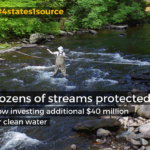
Trout Unlimited is leading a major project to protect clean water in the New Jersey Highlands, as a member of the Delaware River Watershed Initiat ive (DRWI). The William Penn Foundation announced more than $40 million in new funding for the DRWI, which is among the country’s largest non-governmental conservation efforts to protect and restore…

By David Kinney Answering calls for action to protect the Delaware River and its prized wild trout fishery from extreme low flows this summer, New York City agreed today to voluntarily boost releases from its water supply reservoirs. This is a welcome step back from the brink. Officials from the city and the Delaware River…
12/5/2001 Upper Delaware Flows to Plummet to Ecological Disaster Levels Upper Delaware Flows to Plummet to Ecological Disaster Levels Low Flows Threaten Fish Kills Contact: Nat Gillespie (607) 498-5960 12/5/2001 — HANCOCK, N.Y.– — A drought emergency has been declared for the New York City reservoirs in the Upper Delaware basin. The drought emergency threatens…












